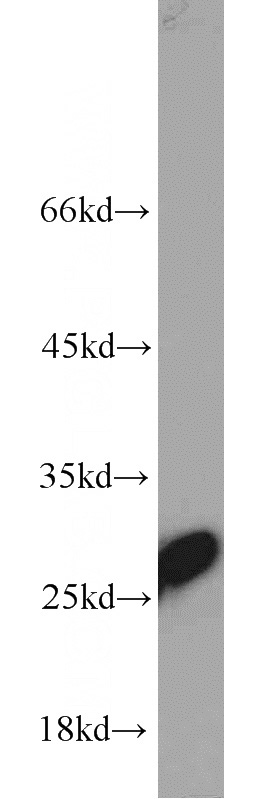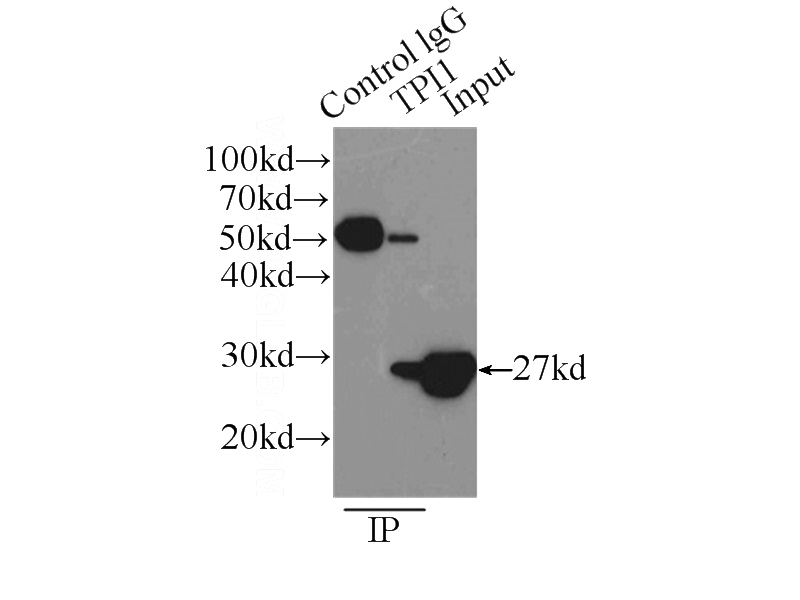-
Product Name
TPI1 antibody
- Documents
-
Description
TPI1 Rabbit Polyclonal antibody. Positive WB detected in HepG2 cells, A431 cells, HEK-293 cells, rat kidney tissue, rat liver tissue. Positive IP detected in HEK-293 cells. Observed molecular weight by Western-blot: 27kd
-
Tested applications
ELISA, WB, IP
-
Species reactivity
Human,Mouse,Rat; other species not tested.
-
Alternative names
TIM antibody; TPI antibody; TPI1 antibody; Triose phosphate isomerase antibody; Triosephosphate isomerase antibody; triosephosphate isomerase 1 antibody
-
Isotype
Rabbit IgG
-
Preparation
This antibody was obtained by immunization of TPI1 recombinant protein (Accession Number: NM_000365). Purification method: Antigen affinity purified.
-
Clonality
Polyclonal
-
Formulation
PBS with 0.1% sodium azide and 50% glycerol pH 7.3.
-
Storage instructions
Store at -20℃. DO NOT ALIQUOT
-
Applications
Recommended Dilution:
WB: 1:1000-1:10000
IP: 1:500-1:5000
-
Validations

HepG2 cells were subjected to SDS PAGE followed by western blot with Catalog No:116265(TPI1 antibody) at dilution of 1:2000

IP Result of anti-TPI1 (IP:Catalog No:116265, 3ug; Detection:Catalog No:116265 1:1000) with HEK-293 cells lysate 2500ug.
-
Background
TPI1(Triosephosphate isomerase) is also named as TIM, TPI and belongs to the triosephosphate isomerase family. It is a key enzyme in cell metabolism that controls the glycolytic flow and energy production through the interconversion of dihydroxyacetone phosphate (DHAP) and D-glyceraldehyde 3-phosphate (G3P)(PMID:19251756). Defects in TPI1 are the cause of triosephosphate isomerase deficiency (TPI deficiency). It can exsit as a homodimer(PMID:18562316).
-
References
- Guix FX, Ill-Raga G, Bravo R. Amyloid-dependent triosephosphate isomerase nitrotyrosination induces glycation and tau fibrillation. Brain : a journal of neurology. 132(Pt 5):1335-45. 2009.
- Seigle JL, Celotto AM, Palladino MJ. Degradation of functional triose phosphate isomerase protein underlies sugarkill pathology. Genetics. 179(2):855-62. 2008.
- Zhong L, D'Urso A, Toiber D. The histone deacetylase Sirt6 regulates glucose homeostasis via Hif1alpha. Cell. 140(2):280-93. 2010.
- Valera VA, Li-Ning-T E, Walter BA, Roberts DD, Linehan WM, Merino MJ. Protein expression profiling in the spectrum of renal cell carcinomas. Journal of Cancer. 1:184-96. 2010.
- Ijiri TW, Merdiushev T, Cao W, Gerton GL. Identification and validation of mouse sperm proteins correlated with epididymal maturation. Proteomics. 11(20):4047-62. 2011.
- Miller D, Hannon C, Ganetzky B. A mutation in Drosophila Aldolase causes temperature-sensitive paralysis, shortened lifespan, and neurodegeneration. Journal of neurogenetics. 26(3-4):317-27. 2012.
- Celotto AM, Liu Z, Vandemark AP, Palladino MJ. A novel Drosophila SOD2 mutant demonstrates a role for mitochondrial ROS in neurodevelopment and disease. Brain and behavior. 2(4):424-34. 2012.
- Ijiri TW, Vadnais ML, Lin AM. Male mice express spermatogenic cell-specific triosephosphate isomerase isozymes. Molecular reproduction and development. 80(10):862-70. 2013.
Related Products / Services
Please note: All products are "FOR RESEARCH USE ONLY AND ARE NOT INTENDED FOR DIAGNOSTIC OR THERAPEUTIC USE"
